Diary of the trip to Kenya, 2nd part
Conclusion of the Pan African EoC School and the beginning of the CUEA Conference, January 26, 2011
To understand the EoC, one needs "hunger for life and for the future"
By Luigino Bruni
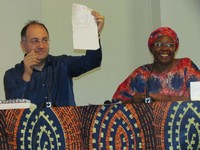 Nairobi, January 26, 2011 – Yes, yesterday the 1st Pan African EoC School concluded in Mariapolis Piero, and today, on the 30th anniversary of the death of Piero Pasolini (one of the first focolarini to bring the charism of unity to Africa) here in Nairobi, we have begin the conference at Catholic University.
Nairobi, January 26, 2011 – Yes, yesterday the 1st Pan African EoC School concluded in Mariapolis Piero, and today, on the 30th anniversary of the death of Piero Pasolini (one of the first focolarini to bring the charism of unity to Africa) here in Nairobi, we have begin the conference at Catholic University.
This Pan African school has been one of the most impacting EoC events that I can remember: these peoples (and there were many countries represented, from all over Sub-Saharan Africa) adhere to the charism of Chiara Lubich with a purity that has truly touched me. We invited them to make a pact "of commitment" to spread the Economy of Communion in Africa by signing their names on a white sheet of paper. We clarified that the choice be freely made but that the pact was serious, and that they should only sign if they felt this vocation to the EoC out of love for Africa. Many, many signed the pact, with great solemnity. Then, yesterday, at mass with the Apostolic 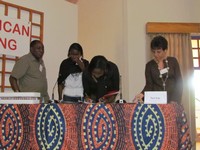 Nunciature, we presented the four sheets with signatures on the altar. Genevieve Sanze should have been the one to bring them and say a prayer during the offertory, but she asked me to do it. I was caught off guard. I tried to open my mouth to pray, and said "Lord, welcome these signatures which are the sign that we have offered our lives so that an economy of communion may spread in Africa...". But then I couldn't continue. I wasn't able to speak anymore because the emotion was so strong.
Nunciature, we presented the four sheets with signatures on the altar. Genevieve Sanze should have been the one to bring them and say a prayer during the offertory, but she asked me to do it. I was caught off guard. I tried to open my mouth to pray, and said "Lord, welcome these signatures which are the sign that we have offered our lives so that an economy of communion may spread in Africa...". But then I couldn't continue. I wasn't able to speak anymore because the emotion was so strong.
What flashed through my mind was like a scene in a movie, the suffering of these peoples when my European brothers came to these lands to rip away people and resources, to treat them like slaves, like half-people. And I thought of Chiara Lubich, of many missionaries who came here giving their lives (and how many have died!) in the past centuries, beginning social works to relieve the sufferings of these peoples. I thought of our men and women focolarini who gave and give their lives. But most of all, I looked at the hundred or so people who were there, one by one, who had given themselves so that, with the EoC, Africa can find its way.
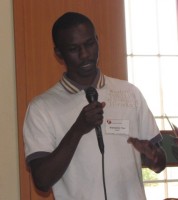 There was much love and much hope in those signatures. And I was without words, making a "great" impression in front of the Nunciature (to whom I had been presented as responsible of the project!). Anyways, even those tears produced more fraternity and equality with everyone, maybe showing that we had not gone there to speak about theories but that we felt the joys, hopes and pains of those lands on our shoulders.
There was much love and much hope in those signatures. And I was without words, making a "great" impression in front of the Nunciature (to whom I had been presented as responsible of the project!). Anyways, even those tears produced more fraternity and equality with everyone, maybe showing that we had not gone there to speak about theories but that we felt the joys, hopes and pains of those lands on our shoulders.
The liturgy of the first day had spoken of Jesus who chose the twelve. Today, the liturgy spoke of Jesus who chose the 72 disciples. Everything spoke of mission, of apostolate. The liturgy always accompanied us through these founding moments.
We're living an important moment. For many, it is like reliving something similar to the "Brazilian bomb".
Some concrete details:
• The first 15 associates of the future business park at Mariapolis Piero have come forward, and the first funds have also arrived.
• Ten or so entrepreneurs present formally adhered to the EoC with their businesses, and this 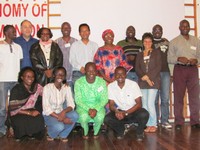 is something immense to me. They outlined some concrete projects, starting with themselves. With one business in Burundi, the Bangco Kabayan will join as partner in a micro-credit program, starting the bank's first activity outside the Philippines.
is something immense to me. They outlined some concrete projects, starting with themselves. With one business in Burundi, the Bangco Kabayan will join as partner in a micro-credit program, starting the bank's first activity outside the Philippines.
• The Pan African EoC Commission has been established, with Genevieve Sanze as coordinator (she is also member of the central commission), two secretaries at Mariapolis Piero (which will be the headquarters of the commission) and a representative in every zone in Africa.
Teresa Ganzon, John Mundell, Leo Andringa, Giampietro and Elisa Parolin, Francesco Tortorella, and their families, were a gift for everyone. The final celebration was 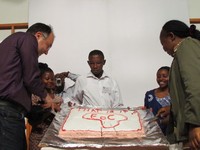 beautiful, and many of the guests contributed artistic pieces (John and his wife Julie, Giampietro, Leo and Anneke, Teresa and her husband Francis and daughter Alexandra).
beautiful, and many of the guests contributed artistic pieces (John and his wife Julie, Giampietro, Leo and Anneke, Teresa and her husband Francis and daughter Alexandra).
There is a beautiful understanding with everyone, including the zone directors of the Focolare here. Even if we work a lot, doing it together makes the yolk light, and more than anything there is much joy, and we laugh a lot.
Starting today, we'll be at CUEA. Many of the participants of the School came, joined by students and professors from the university. We opened with the message of the Cardinal who is president for the Vatican's Council of Justice and Peace. They followed the presentations on the EoC and African culture, with much dialogue and interest. Lunch was very elegant, and then in the afternoon we continued with working groups. The context has changed, but there is still the sensation that we are living very special and intense days.
A permanent course on the EoC should emerge as a result of this convention. It will be brought 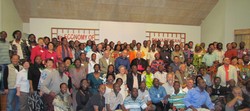 ahead by professors from our group. We must invest in Africa - there's need and enthusiasm for it. These "younger" peoples (editor's note: even if we're close to the Rift Valley) have a hunger for life and future, which is the pre-condition to understanding the EoC and, even before that, Chiara Lubich's charism of unity. If this "hunger" lacks, there is no hope that someone will understand the charism. Here, people want to live. I was touched by how much the young people here love to study. For them, getting into college is the goal of their life, because it means future. You see people studying at night, below street lamps because they have no light at home (and I thought of our young people who are often listless because they have everything, and therefore their desire is snuffed out like a candle). Without this desire and hunger for future, our movement cannot grow.
ahead by professors from our group. We must invest in Africa - there's need and enthusiasm for it. These "younger" peoples (editor's note: even if we're close to the Rift Valley) have a hunger for life and future, which is the pre-condition to understanding the EoC and, even before that, Chiara Lubich's charism of unity. If this "hunger" lacks, there is no hope that someone will understand the charism. Here, people want to live. I was touched by how much the young people here love to study. For them, getting into college is the goal of their life, because it means future. You see people studying at night, below street lamps because they have no light at home (and I thought of our young people who are often listless because they have everything, and therefore their desire is snuffed out like a candle). Without this desire and hunger for future, our movement cannot grow.
We had important meetings, in an atmosphere of the Word of the Gospel. In many African 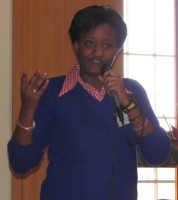 women, beautiful with a beauty that has been a lost in the West, I saw women of the Gospel and of the Bible, with their concrete love for Jesus, for the apostles and for the prophets. Africa speaks much of women (I understood why someone had proposed that the Nobel prize be given to the women of Africa!), because in them they carry the greatest wounds and the greatest blessings of these peoples (including our women focolarine).
women, beautiful with a beauty that has been a lost in the West, I saw women of the Gospel and of the Bible, with their concrete love for Jesus, for the apostles and for the prophets. Africa speaks much of women (I understood why someone had proposed that the Nobel prize be given to the women of Africa!), because in them they carry the greatest wounds and the greatest blessings of these peoples (including our women focolarine).
I saw Zacchaeus in the person of a well-off Cameroonian man who, during these days, wanted to give part of his goods for the EOC. "I'm from Fontem," he said, "The movement saved my baby's life. It gave me the chance to study at the College. Today, I understood that I should also give." I also saw Nicodemus, in an elderly man from Douala, who felt the desire to be reborn in the Spirit, adhering with his business to the EoC.
But most of all, I saw Mary at work in her Work (editor's note: "Work of Mary" is the official name of the Focolare Movement), in the songs ("Mother Mary") sung in the beautiful liturgies, and who is very present in these lands. And I could continue, but...I won't because tomorrow, another intense day is awaiting us, which should also be even more beautiful. "The Earth is full of your Spirit, Lord".






